
A scene from 5th & Bonnie Brae that appears in the book, captures a gritty reality of life in the Los Angeles neighborhoods. (Photo by Forest Casey. Provided by Jesse Katz)
In “The Rent Collectors: Exploitation, Murder, and Redemption in Immigrant LA,” Jesse Katz, a former staff writer for the Los Angeles Times and Los Angeles Magazine, writes about Giovanni Macedo, a former member of the Columbia Lil Cycos gang.
Macedo was tasked with carrying out a hit on a vendor who refused to pay the gang’s protection tax. But Macedo botched the job, accidentally killing a newborn in the crossfire. His mistake placed him in the crosshairs of his gang, leading to a violent retaliation in which he was strangled and left for dead. Remarkably, Macedo survived the near-fatal attack and eventually found a way out of the suffocating grip of gang life.
While Katz and Macedo spent five years together, though not under the same roof, their lives became intricately woven together through the delicate dance of storytelling—Katz peeling back the layers of Macedo's past, and Macedo, in turn, confronting the dark corners of his soul.
This interview has been edited for length and clarity.
How has it been for you to live with this book for over five years?
Since the book came out, like any author, I had some degree of trepidation. How is this going to be received? I'm dealing with some very sensitive issues for people. It's often the most negative or horrific thing they've ever experienced in their entire life. So you're really delving deep into a very private space for a lot of people bringing that to light. That can be uncomfortable for the subject. It also makes the author of that feel, I suppose, nervous. You just feel that responsibility to be accurate, but also to be empathetic and make sure that what is reflected in those pages rings true to those people.
I've been really heartened that the people I've heard from have responded with a really generous perspective, from the law enforcement side, the homicide detective, the FBI agent, but more importantly for me, Giovanni Macedo, the person at the center of the story. More than anybody, it really exposes his life, the family hardships, all the layers of challenges he’s dealt with. Ultimately, there were aspects of his life, pieces of his story, that were lost. Things about his childhood, aspects of his mom's journey from El Salvador, his dad's death in Mexico that he just didn't know. So I think he was beginning to see the pieces of his life assembled in a way that he found really illuminating.
In the beginning of the book, you have an organization chart of the entire gang you focus on. Almost any of these people can probably have their own book written about them, and for it be almost, if not more interesting. So tell me why Giovanni's story?

"The Rent Collectors" explores the harrowing journey of Giovanni Macedo, a former gang member, as he navigates the brutal realities of gang life and seeks redemption.
There were things about Giovanni that were very raw, on a visceral level. The book is about two botched murders and here's the kid who is the perpetrator of one and then the survivor of the other. So you have somebody who has lived very close to the action and is able to narrate both the shooting that he committed and the strangulation that he endured. It takes you really close. I would add to that the fact that he was so young. You had other characters who were interesting, but they were in their 30s, 40s or 50s. As all this is going down, he's basically 17. He's a kid and he wants so badly to belong and to be accepted. But I really believe that what motivated him and the gang, sadly, was a more stable social institution than the one under his own roof.
In the latter half of the book it really does become this story of redemption and transformation because of how young he is. Do you believe that Gio’s story reveals anything about the broader narrative of redemption and transformation?
At the most rudimentary level, I do think that people grow out of crime. We do stupid stuff when we're teenagers. There are tests of manhood in our culture that are dangerous or toxic, and Giovanni bought into all of those things as a kid, but he's 35 now. You don't look at the world the same way. People who are released after decades in prison, we know that their recidivism rate is really low. So yeah, we people age out of crime. Beyond that, I think he had to in order to sort of save himself. He turns himself in, he confesses, he agrees to cooperate with the government and that required him to renounce the gang.
All the experiences he's had in prison from developing his education … in the time that I've known him, he’s earned his GED and he's begun taking community college classes. I mean, he's really feeding his brain with some nutritious stuff. He's been working within the prison. He had originally a job with the bakery and he's been installing cable TV lately. I know prison work is controversial because they're all exploited as laborers and paid a pittance. But he's also staying busy, he's using his hands, he's developing some skills that might serve him on the outside. You want to improve your life? You're going to need to embrace that kind of work.
That's interesting. Did Giovanni's development in prison change how you wrote the book over time? Did you have a different outlook of how Giovanni was going to be portrayed when you began?
I certainly approached him with an open mind. I'm a strong believer in suspending the moral high ground. I didn't reach out to him to judge him; it was really to understand him. And when I met him, he wasn't in a great place. He didn't have strong family support, and he was quite alone and quite isolated. My presence, I do think, changed his outlook. I was going to visit him, I still am, once a month, and he's told me that if I'm making the effort to come see him every month, then he needs to make the effort to use that time to work on himself. He felt accountable to me. He did feel that he felt like he owed it to me to be putting in the work to make himself a better person.
I deliberately wanted to leave myself out of the book as a character. I didn't want to suggest that my presence was somehow really dramatic and I certainly don't want to be any sort of hero in this story. But there's no doubt that our relationship has helped kind of solidify the path that he's on. And, of course, our relationship continues.
Does this book do anything for Giovanni? I question if the book’s existence does anything for his case.
It seems to me that if the parole board wanted to be cynical, they could say, “What's this book all about? Why have you been spending your time doing some self-aggrandizing project rather than doing the hard work?” And I think that would be unfair. They might also question him, what was in it for him? Was he drawn to attention? Did he make any money off of it? The answer to that is, no. It's going to sound kind of corny and earnest, but he just felt that being part of the book was a blessing, because it was an opportunity. It became an opportunity for self-reflection. It gave him a chance to and it gave him an occasion to think really hard about who he is, what he wants and who he wants to become. I don't know if it will help him specifically with the parole board. I don't know that the parole board will look at him more sympathetically because of the book, but I think it will give Giovanni more tools than he didn’t have before to make his presentation to the parole board. He understands his story now in a way in which he didn't when I first met him.

Jesse Katz's “The Rent Collectors” portrays the gripping tale of Giovanni Macedo’s gang life and quest for redemption, revealing the intense and often painful realities of his past. (Photo provided by Jesse Katz)
Then, there’s your portrayal of Francisco Clemente, the survivor of the story. There’s this internal conflict he deals with between justice and forgiveness. How did your understanding of his emotions evolve as you wrote about him?
He still has two of Giovanni's bullets embedded in his flesh and bone. He walks around with that every day. This is very present and very real for him. I think when I first met him, the story that was easier for Francisco to tell was the one of vengeance. That's easy to understand and it was easier for him to express, the more I got to know him. But I saw him really wrestling with the pain he'd experienced and the shock waves of it that continue to reverberate through his life.
When words like forgiveness come up, which I ultimately discovered towards the end of finishing the book, it really clicked that Giovanni and Francisco don't know each other. The perpetrator and the victim, they're utter strangers to each other. They're in each other's presence for maybe three seconds, and then never again. Once Giovanni agrees to cooperate with the government, he's now on the same side as Francisco. So Giovanni's not on trial, and so Francisco's is not witnessing him in that way. When Francisco's testifying, Giovanni's literally never in the courtroom at the same time, because they're on the same team at that point. And so I'm not sure that Francisco even knows Giovanni's name. But there was a point at which Giovanni asked me to remind him what his victims' names were.
A story of strangers. I never thought about it that way.
Their lives are so intimately connected. Their lives have been forever altered by this encounter, and yet they know nothing about each other. It's just so weird and ultimately, not very helpful, right? I think they would both benefit from some sort of confrontation, reconciliation. I'm not even sure it's my role to bring them together but I wish they were in a position where they could embrace that opportunity and take advantage of that mechanism to get to know each other.
How do you view your role in this story?
Well, I felt like my job is to, in some ways, shine a light where people are. People's stories might be cloaked in darkness or shadows. I think over my years of reporting in Los Angeles, I've always kind of looked for stories that are outside of my experience, my personal experience, and experiences of people who are often overlooked or misperceived, or, even worse, stigmatized or demonized in some ways. I'm not trying to put anyone on a pedestal or kick anyone to the curb, but it's just to flesh out their experience, their perspective. We look at people in our daily lives, but we don't really see them. We literally step over them as we're walking down the sidewalk
I wonder how living in MacArthur Park shaped your perspective and the story you tell. Is this story personal at all?
I'm certainly sensitive to all the ways that outsiders can parachute into a story and be insensitive and colonize. Although I believe we should be able to write about anything we want to write about, our creative instincts shouldn't be limited to our own personal background. I do think you need to earn your facts, earn your way in approaching people with respect and empathy, and just be aware of all the ways that they might be suspicious of you. I come from an immigrant family. My mom escaped from Nazi occupied Europe during World War Two and came to America at age six on a boat, then landed in New York. My first marriage was to a undocumented woman from Nicaragua and I was part of an extended Nicaraguan family in the U.S. and in Nicaragua. I learned a good chunk of my Spanish from that experience. I was really shaped by the way that my ex-wife looked at the world.
On top of that, if you really want to get personal, I had a stepson from my first marriage, where I really struggled to see eye to eye, and I think he came into my life with a lot of anger and resentment, a lot of it legitimate. [He] just wasn't really receptive to my guidance or just way of doing things and that brought him into the world of the streets. He was drawn to that world into some real danger out there and contacts with the law enforcement. One of my great regrets in life is that I was just never able to be the positive influence in his life that I wanted to be. So, there are a lot of parallels between that young man's life and Giovanni’s. So I see him in Giovanni in a lot of ways. I don't know if the book makes up for my prior disappointment and frustration, but it felt good to be needed by Giovanni.
There seems like there's a lot of connected stories of redemption and transformation.
Yeah, I think we all have aspects of our life that we regret, you know, that we weren't our best selves. One of the beautiful things about being human is that it's never too late to grow and evolve and try to be more aware of who you are and how you relate to other people.
Has Giovanni read the book?
Giovanni is in the middle of reading it. You can't send hardcover books to prison because they will be potentially used as a weapon. So you can only send paperbacks, and the book is not commercially available as a paperback. So what I've done is I've printed it out, shrunk the font and I've been mailing it to him in pieces. You can't put more than 10 sheets of paper in an envelope, or it'll be rejected. I've probably sent him 30 plus envelopes and you're hoping they all arrive. But, to see it all assembled into a narrative, to see yourself at the center of this crazy, beyond belief story… I think that's got to be a lot of dissonance as you try to make sense of it.
You can buy a copy of“The Rent Collectors: Exploitation, Murder, and Redemption in Immigrant LA" here.

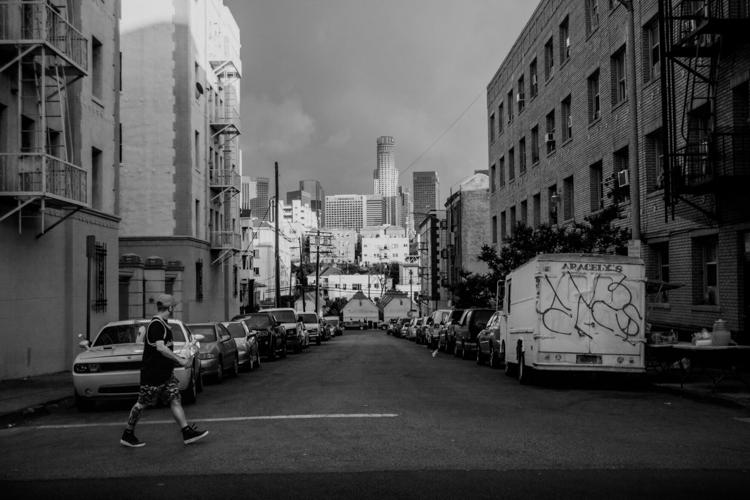
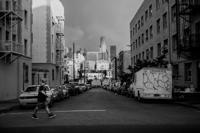
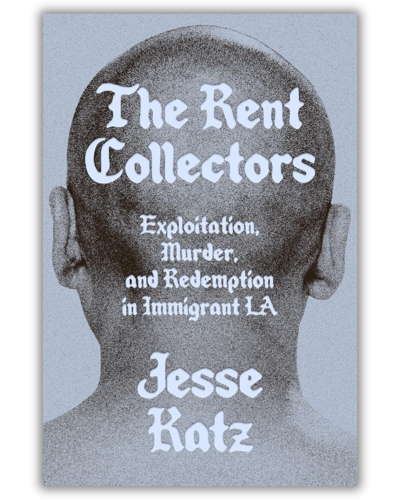
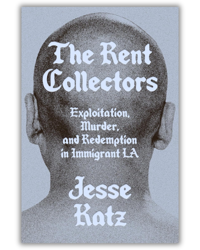
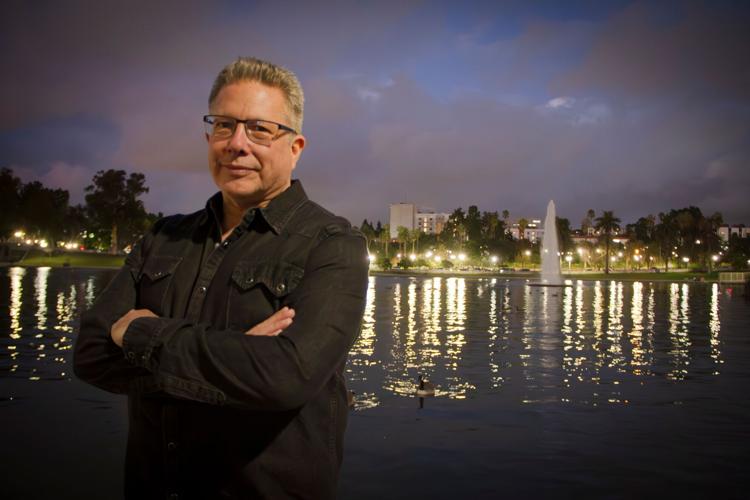
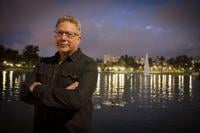








(0) comments
Welcome to the discussion.
Log In
Keep it Clean. Please avoid obscene, vulgar, lewd, racist or sexually-oriented language.
PLEASE TURN OFF YOUR CAPS LOCK.
Don't Threaten. Threats of harming another person will not be tolerated.
Be Truthful. Don't knowingly lie about anyone or anything.
Be Nice. No racism, sexism or any sort of -ism that is degrading to another person.
Be Proactive. Use the 'Report' link on each comment to let us know of abusive posts.
Share with Us. We'd love to hear eyewitness accounts, the history behind an article.